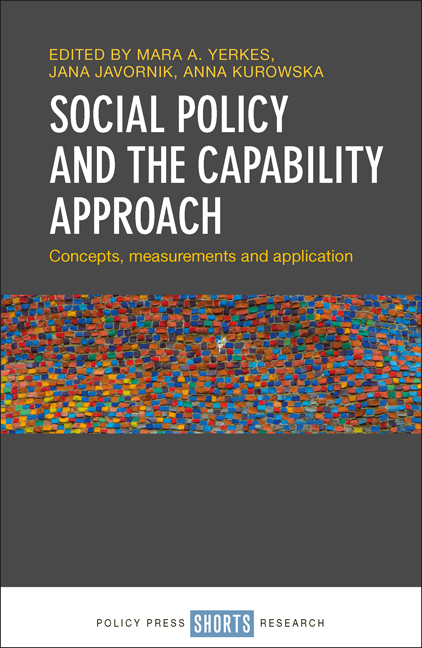Book contents
- Frontmatter
- Contents
- List of figures and tables
- Notes on the editors
- Notes on contributors
- one Rethinking social policy from a capability perspective
- two Education as investment? A comparison of the capability and social investment approaches to education policy
- three From ‘active’ to ‘capable’: a capability framework for policy and practice on ageing and later life
- four Converting shared parental leave into shared parenting: the role of employers and use of litigation by employees in the UK
- five Comparative social policy analysis of parental leave policies through the lens of the capability approach
- six Ask rather than assume: the capability approach in the practitioner setting
- seven Social investment, human rights and capabilities in practice: the case study of family homelessness in Dublin
- eight From the capability approach to capability-based social policy
- Index
one - Rethinking social policy from a capability perspective
Published online by Cambridge University Press: 30 April 2022
- Frontmatter
- Contents
- List of figures and tables
- Notes on the editors
- Notes on contributors
- one Rethinking social policy from a capability perspective
- two Education as investment? A comparison of the capability and social investment approaches to education policy
- three From ‘active’ to ‘capable’: a capability framework for policy and practice on ageing and later life
- four Converting shared parental leave into shared parenting: the role of employers and use of litigation by employees in the UK
- five Comparative social policy analysis of parental leave policies through the lens of the capability approach
- six Ask rather than assume: the capability approach in the practitioner setting
- seven Social investment, human rights and capabilities in practice: the case study of family homelessness in Dublin
- eight From the capability approach to capability-based social policy
- Index
Summary
Introduction
European social policies address a broad array of issues, including (un)employment, activation, child- and elderly care, education, health, housing, migration, aging and poverty (Yerkes, 2015). The design and evaluation of these policies have been approached from multiple perspectives, including the social investment paradigm, which has featured prominently in recent research (for example, Hemerijck, 2017). With respect to this and other approaches, a key question increasingly being asked is: to what extent do European social policies empower individuals to freely use the tools and instruments created by these policies, or, in the capability language, to what extent do they enhance what individuals are truly able to do and be, their ‘capabilities’ (Sen, 1992)? We argue that the capability approach (CA) as developed by Sen (Sen, 1992; 1999a), and later expanded on by Nussbaum (Nussbaum, 2000; 2011) and Robeyns (Robeyns, 2005; 2017), offers a unique evaluative perspective to both researchers and practitioners of social policy (for example, Morel and Palme, 2017; Otto et al, 2017). The CA sees individuals as embedded in broader contexts, acknowledging that these contexts shape the real opportunities which individuals face (Javornik and Kurowska, 2017; Kurowska, 2018). Thus, what individuals are really able to do and be is a reflection of their capabilities, their agency (that is, being ‘active agents of change’ (Sen, 1999b: 189)) and choice (Robeyns, 2017), within the diverse contexts in which individuals are embedded (Hobson, 2014; 2016; Hvinden and Halvorsen, 2018). The increase in the use of the CA is evident across multiple social policy areas, such as disability policy (Trani et al, 2011), education policy (Walker, 2006), employability policy (van der Klink et al, 2011), family policy – including such areas as work–family policy (den Dulk and Yerkes, 2016; Fahlén, 2013; Hobson, 2014; Korpi et al, 2013; Yerkes and den Dulk, 2015), parental leave policy (Javornik and Kurowska, 2017; Koslowski and Kadar-Satat, 2018) or childcare policy (Yerkes and Javornik, 2018), and youth transitioning from school to work (Otto, 2015). The CA has also been recently used to reconceptualise the (de)familialisation perspective in comparative family policy research (Kurowska, 2018).
Applying the CA in social policy research leads to debates about its conceptualisation, measurement and application in empirical research (for example, Anand et al, 2009). A key issue in these debates is how to account for the role of social policies when analysing individual capabilities.
- Type
- Chapter
- Information
- Social Policy and the Capability ApproachConcepts, Measurements and Application, pp. 1 - 18Publisher: Bristol University PressPrint publication year: 2019



